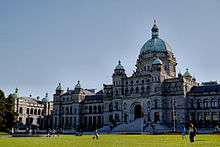Vancouver Charter
The Vancouver Charter is a provincial statute that incorporates the City of Vancouver, British Columbia, Canada. The legislation was passed in 1953 and supersedes the Vancouver Incorporation Act, 1921.[1] It grants the city different powers than other communities in the province, which are governed by the Local Government Act (British Columbia).[2]
| Vancouver Charter | |
|---|---|
 | |
| Legislative Assembly of British Columbia | |
| Citation | Vancouver Charter, SBC 1953, c. 55 |
| Enacted by | Legislative Assembly of British Columbia |
| Passed | 1953 |
| Repeals | |
| Vancouver Incorporation Act, 1921 | |
| Summary | |
| Incorporation documents of the City of Vancouver | |
| Status: In force | |
Additional powers
Some of the additional powers and provisions provided by the Vancouver Charter include:[3]
- The ability to borrow on its own authority without the approval of the Municipal Finance Authority/Greater Vancouver Regional District.
- A separately elected park board
- Statutory immunity in relation to building regulation both with respect to plan checking and building permit issuance as well as with respect to building inspections.
- The authority to prohibit business or business activities
- Unique planning and land-use tools, including the power to delegate to the Director of Planning
- The authority to impose specialized development levies.
History
Previous legislation
The city was first incorporated on April 6, 1886 under the Vancouver Incorporation Act, 1886. The Act limited voting rights to men who owned property at least the age of 21, and women who were single, divorced, or widowed, over the age of 21 and owned property. The act also forbid women from sitting as the mayor or as an alderman. The act also stated that "No Chinaman or Indian shall be entitled to vote in any municipal election".[4]
The incorporation act would be repealed and replaced in 1900 and 1921 prior to the introduction of the Vancouver Charter.[5]
Olympic amendments
On January 12, 2009 Vancouver's mayor Gregor Robertson requested an amendment to the Charter to allow the city to borrow $458 million to fund the completion of the 2010 Olympic Village in False Creek without seeking approval from taxpayers in an election-day plebiscite.[6] Robertson said this was due to extraordinary circumstances.[6] The amendment was passed on January 18, 2009 in an emergency session of the Legislative Assembly of British Columbia.[7][8]
References
- Vancouver Charter, SBC 1955, c. 55, Part XXVIII
- "The Vancouver Charter". Vancouver.ca. City of Vancouver. Retrieved 31 July 2020.
- Craig McFarlane (September 25, 2007). Community Charter and Local Government Act Municipal Powers Compared to the Vancouver Charter (PDF) (Report). City of Surrey. Retrieved July 31, 2020.
- "Planning Vancouver Together: Vancouver Today Reference Guide" (PDF). vancouverplan.ca. City of Vancouver. p. 37. Retrieved 31 July 2020.
- "Vancouver Charter (Vancouver Incorporation) Act". Couthouse Libraries BC. Retrieved 31 July 2020.
- "Vancouver seeks charter change to borrow $458M for Olympic Village", CBC, January 12, 2009.
- "Legislation lets Vancouver borrow for Olympic village" Archived 2012-11-07 at the Wayback Machine, The Daily News, January 19, 2009.
- "City gets its emergency borrowing bid" Archived 2012-11-07 at the Wayback Machine, Vancouver Province, January 18, 2009.